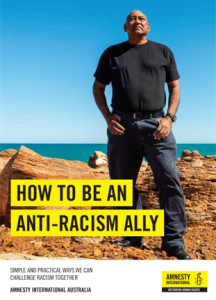The answers revealed
Keep an eye on your phone – we’ll be in touch to send your anti-racism ally guide to you! The guide presents simple and practical advice for all of us, as we strive to better recognise and address racism. We’ve included stories of lived experience and allyship, helpful conversation starters, recommended books, movies and podcasts, ways of taking action, and more.

Question 1: Your friend touches strangers’ hair without asking, commenting “it’s so exotic!”
Answer: Yes – Remarking that someone’s hair is exotic might be meant as a compliment but it can be othering. On top of that, touching hair without permission can feel objectifying. Many black people experience discrimination based on their hair and face societal and political pressure to change their hairstyles.
Question 2: You meet someone with an unfamiliar name and ask, “I’m sorry I might’ve mispronounced that. Could you please repeat your name for me?”
Answer: No – It’s okay to feel unsure when you read or hear an unfamiliar name for the first time. But try to remember that repeatedly mispronouncing someone’s name can make the person feel alienated and different. So when in doubt, just ask or do a bit of research! Actively listen, practice and clarify if you need to.
Question 3: The manager of the grocery shop keeps mixing up the names of their two First Nations employees
Answer: Yes – One way people often experience casual racism is when they are mixed up with other colleagues or friends, simply based on their skin colour. Although unintended, this can make people feel invisible or defined by their physical features.
Question 4: Your politics teacher always calls on Sally to answer questions about China, even though she’s Korean
Answer: Yes – Actions like these lump people from certain cultural or ethnic backgrounds into a single group – as if they all think, feel and believe the same things!
Question 5: You’re at the shops with Lila who wears a headscarf. At the register, the shopkeeper says, “Your English is really good, where are you from?
Answer: Yes – Questions like ‘Where are you from?’ are often innocently asked to show interest
in someone. However, if you ask it when first meeting someone based on
assumptions about their physical appearance, accent, or name can lead to that
person feeling set apart from other Australians. This question may make them feel like they need to justify their background
We hope you enjoyed the quiz!
Together, we can challenge racism by raising our voices for a better world, where human rights are enjoyed by all. You are part of a movement defending equality and demanding safety and a fair justice system for all.
From all of us at Amnesty, thank you for embarking on this journey with us as an anti-racism ally. Your support as an ally is changing lives.